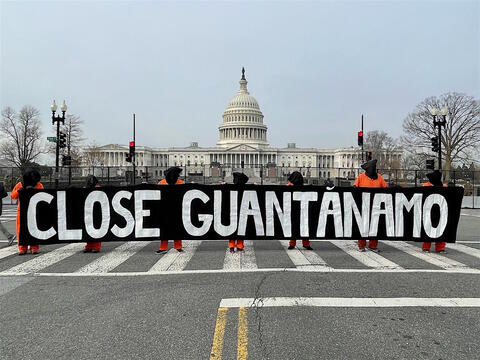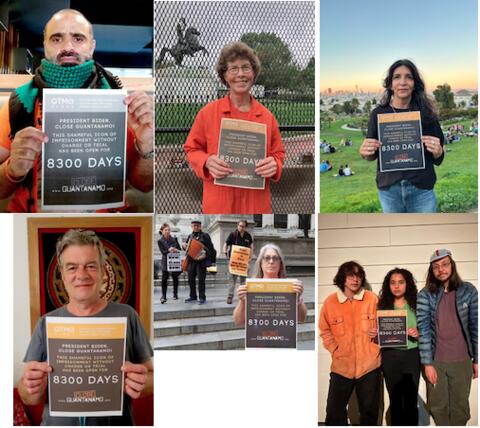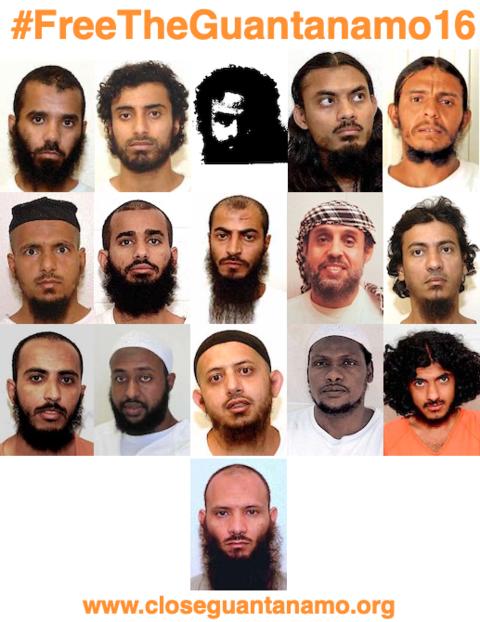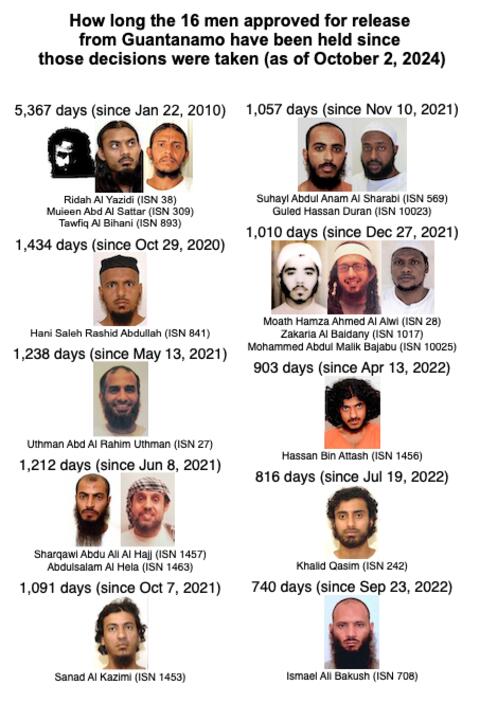The Bleakness of Guantánamo, as Biden’s End Nears

A photo by Alli McCracken of campaigners with Amnesty International and Witness Against Torture calling for the closure of Guantánamo on January 11, 2021, the 19th anniversary of its opening.
If you can, please make a donation to support our work throughout the rest of 2024, and into 2025. If you can become a monthly sustainer, that will be particularly appreciated. Tick the box marked, "Make this a monthly donation," and insert the amount you wish to donate.
By Andy Worthington, October 21, 2024
In the epidemic of disasters afflicting the world, it’s sometimes hard to even remember that, at Guantánamo Bay in Cuba, the U.S. government is still holding 30 men, detained for between 15 and 22 years, who, for the most part, have never been charged with crimes, and are imprisoned, apparently indefinitely, without charge or trial.
With just a fortnight to go until the U.S. Presidential Election, these men’s plight has become politically invisible, even though their treatment — outside of all norms governing the deprivation of liberty of individuals — has, from the beginning, relied on their demonization and dehumanization as Muslims, with a clear line stretching from their fundamentally lawless imprisonment to the way that demonized and dehumanized Muslims are being treated in the Gaza Strip today.
Now suffering under their fourth president, the men at Guantánamo had some hope, when Joe Biden took office, that positive changes were on the horizon. NGOs and lawyers had lobbied his transition team, urging that, at the very least, he address the plight of those specifically imprisoned indefinitely without charge or trial, as opposed to those charged in the military commissions, a broken system, first introduced after the 9/11 attacks, before Guantánamo even opened, albeit one with some tangential connection to the law.
At the time of his inauguration, Biden was holding 40 men, 22 of whom were "forever prisoners," held indefinitely without charge or trial. Six others had already been approved for release but were still held, while the other 12 were, to some extent or another, under the jurisdiction of the military commissions.
From May 2021 to September 2022, the Biden administration addressed these concerns. All but three of the "forever prisoners" were approved for release by Periodic Review Boards, the high-level parole-type process established under President Obama, which had previously and repeatedly recommended their ongoing imprisonment.
In addition, between July 2021 and April 2023, ten prisoners in total were released, reducing the prison’s population by a quarter, and making concrete steps towards its final closure seem almost within reach.
Then it all fell apart.
No releases for a year and a half
Even though 16 of the 30 men still held have long been approved for release, none have been freed in the last 18 months. A complication is that, although the ten men previously freed were all repatriated, third countries must be found for these 16 men — mostly Yemenis — because Republicans in Congress, since the early days of the Obama administration, have insisted on inserting provisions into the annual National Defense Authorization Act (NDAA), proscribing the return of prisoners to certain countries, including Yemen, Libya, Somalia and Afghanistan.
President Biden made an effort to address this problem by appointing a former ambassador, Tina Kaidanow, as the Special Representative for Guantánamo Affairs in the State Department in August 2021, who was "responsible for all matters pertaining to the transfer of detainees from the Guantánamo Bay facility to third countries."
Despite a lack of high-level support within the administration, and stymied by a general lack of interest around the world in resettling former prisoners, Kaidanow nevertheless successfully negotiated the proposed resettlement, in Oman, of eleven of these 16 men, who were supposed to have been freed last October.
Shamefully, however, even though an airplane was on the tarmac at Guantánamo to take these men to their new lives, the October 7 attacks in southern Israel by Hamas and other militants persuaded Biden and his senior officials that the "political optics" no longer supported their release, and the plan was shelved, with no new date set for it to be reinstated.
Sadly, we have just heard that Tina Kaidanow has died, at just 59 years of age, without having been able to see her last, largely ignored but hugely important post yield the fruit it deserved: the removal of one dark and enduring stain on the U.S.’s reputation, through the restoration of these men’s freedom.
Broken trials and U.N. condemnation
In the military commissions, too, the administration has slammed the brakes on any progress in the seemingly endless effort by the U.S. government to successfully prosecute men subjected to horrendous torture in CIA "black sites" prior to their arrival at Guantánamo, mostly in September 2006.
Three years ago, prosecutors finally recognized that the use of torture precluded the possibility of successful prosecutions, and began negotiating with defense lawyers, and the Convening Authority, the government-appointed official overseeing the commissions, to secure plea deals instead with the men accused of involvement in the 9/11 attacks.
These took the death penalty off the table, and would have provided life sentences at Guantánamo in return for confessions that would have finally allowed for some sort of closure for the relatives of those killed on September 11, 2001. However, when it was announced, in August this year, that plea deals had been agreed with three of these men, the defense secretary, Lloyd Austin, almost immediately revoked them, once more rendering justice and any kind of closure off-limits.
Through this long period of inertia and of counter-productive measures, the U.S. government has also been subjected to withering criticism by various United Nations Special Mandate holders, which, shamefully, it has entirely ignored.
These reports and opinions were published throughout 2023, beginning with condemnation, from numerous Special Mandate holders, on January 11, the 21st anniversary of the prison’s opening, of the treatment of Guantánamo’s most disabled prisoner, Abd al-Hadi al-Iraqi (charged in the military commissions), and continuing with two other devastating opinions, issued by the Working Group on Arbitrary Detention, one in the case of "forever prisoner" Abu Zubaydah, and the other in the case of Abd al-Rahim al-Nashiri (also charged in the military commissions), with the Abu Zubaydah opinion also indicating that the very basis of the detention system at Guantánamo "may constitute crimes against humanity."
Finally, in June 2023, a report issued by Fionnuala Ní Aoláin, the Special Rapporteur on the Promotion and Protection of Human Rights and Fundamental Freedoms while Countering Terrorism, concluded, as a result of assessments undertaken after she became the first ever U.N. Rapporteur to visit the prison, in February 2023, that, despite some improvement in conditions over the years, the prison’s operations overall still constitute "ongoing cruel, inhuman, and degrading treatment," and "may also meet the legal threshold for torture."
So is there hope for the future?
Perhaps, ironically, if Kamala Harris loses to Donald Trump in the Presidential Election, pressure to free all the men approved for release before Trump’s inauguration in January will become unavoidable, because Trump, as he was in his first term in office, will be an absolute disaster for the men held at Guantánamo, sealing the prison shut as he did throughout his four lamentable years as president.
If Harris does win, however, it is to be hoped that there will also be renewed pressure to free the men approved for release, even though the very basis of safe and secure resettlements in third countries — already undermined by the brutal treatment of men resettled in the UAE between 2015 and 2017, who found themselves imprisoned instead of being helped to rebuild their lives, before being forcibly repatriated — was dealt a major blow in August, when Oman, the great hope for the men awaiting release, which had previously accepted 28 Yemenis from Guantánamo between 2015 and 2017, also repatriated these men, mostly against their will, and in defiance of the promises made when they were first taken in — which is, of course, that their resettlement would be permanent.
Alarmingly, Vincent M. Picard, a spokesman for the State Department’s counterterrorism division, stated that, "In general, the United States government has never had an expectation that former Guantánamo detainees would indefinitely remain in receiving countries," even though that provides no explanation whatsoever about where they are supposed to go if their resettlements come to an end.
As Fionnuala Ní Aoláin explained, with reference to the Yemenis in Oman, "Non-refoulement [not returning anyone to a country where they face a risk of torture or other ill-treatment] should be an absolute protection, because countries like Oman have a choice to protect these vulnerable torture survivors or not."
As she also explained, "Sending these men to Yemen puts them in profound danger. Yemen is a country in the midst of a brutal civil war, and is also being bombed by the United States and other allied countries. Sending former Guantánamo detainees, men who have been the victims of U.S. torture and ill-treatment back to Yemen flies in the face of the most fundamental human rights obligations of both Oman and the United States."
What can we do?
On the ground, our options as concerned citizens appear limited, although, as has been the case throughout Guantánamo’s long and sordid history of abject brutality and lawlessness, matched by the almost complete indifference (or even hostility) of most of the political class, the mainstream media and U.S. citizens themselves, those of us who care must continue to do whatever we can to publicize the plight of the men still held, to bear witness to their suffering, and to point out how corrosive the rancid ongoing existence of Guantánamo is to all notions of human rights, due process and international humanitarian law.
Since January 2018, we have been running an ongoing photo campaign, every 100 days of Guantánamo’s existence (and also, every year, on the anniversary of Guantánamo’s opening, on January 11), for which our supporters take photos of themselves — or have photographs taken of them — with posters marking these grim milestones, and calling for Guantánamo’s closure.

A handful of the photos received marking 8,300 days of Guantánamo’s existence.
On October 1, we marked 8,300 days of the prison’s existence, and were delighted to receive 70 photos from across the U.S. and around the world — some from regular participants, and others from new supporters.
The photo campaign was somewhat in the doldrums in the Trump years, and took some time to pick up under Biden, but since last December, when we marked 8,000 days, it has been reinvigorated, in part because of the unique contributions of Gavrilah Wells, an activist in San Francisco, who, uniquely, wanders the streets of her home city with her camera and a copy of the poster, engaging with those she meets, and seeking to get them involved.
As I told her in an email, "You have single-handedly breathed new life into this project, with your wonderful portraits, which capture a largely hidden truth about the U.S. — that people everywhere oppose the continued existence of Guantanamo, but nobody normally asks them what they think. I wish some local or national media would pick up on what you're doing!"
We also continue to highlight the injustice of Guantánamo’s continued existence, through monthly vigils, which take place on the first Wednesday of every month, and have regular support in eleven locations across the U.S. and around the world — in Washington, D.C., in London, New York City, San Francisco, Mexico City, Brussels, Cobleskill, NY, Detroit, Minneapolis and Portland, Oregon.

One particular focus of the vigils is the 16 men approved for release but still held, via a poster of them, and a second poster, which I update every month, and which shows how disgracefully long they have been waiting to be freed since those decisions were taken. On October 2, when the most recent vigils took place, these men had, disgracefully, been waiting for between 740 and 1,434 days since those decisions were taken, and in three outlying cases for 5,367 days.

Sadly, shamefully, the mainstream media have shown no interest whatsoever in either the ongoing photo campaign or the monthly vigils, even though, in particular, the amount of time that the 16 men have been held since they were approved for release is nothing short of a national scandal.
Nevertheless, I believe that our continuing efforts to raise awareness of the glaring injustices of Guantánamo are worthwhile, and I hope you agree. We are all watching intensely what happens on November 5, which won’t, either way, probably help the Muslims in the Gaza Strip, but will hopefully, one way or another, help to, at least, secure freedom for these 16 men. We’ll keep you posted!




